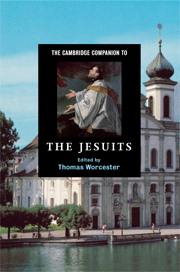Book contents
- Frontmatter
- Introduction
- Part I Ignatius of Loyola
- Part II European Foundations of the Jesuits
- Part III Geographic and Ethnic Frontiers
- Part IV Arts and Sciences
- Part V Jesuits in the Modern World
- 15 The Suppression and Restoration
- 16 Jesuit schools in the USA, 1814-c.1970
- 17 Jesuit theological discourse since Vatican II
- 18 Jesuits today
- Select bibliography
- Index
17 - Jesuit theological discourse since Vatican II
from Part V - Jesuits in the Modern World
Published online by Cambridge University Press: 28 September 2008
- Frontmatter
- Introduction
- Part I Ignatius of Loyola
- Part II European Foundations of the Jesuits
- Part III Geographic and Ethnic Frontiers
- Part IV Arts and Sciences
- Part V Jesuits in the Modern World
- 15 The Suppression and Restoration
- 16 Jesuit schools in the USA, 1814-c.1970
- 17 Jesuit theological discourse since Vatican II
- 18 Jesuits today
- Select bibliography
- Index
Summary
In a 1991 essay reviewing the theological achievements of the Jesuits between the Council of Trent and Vatican II Avery Dulles, S. J., posed the question as to whether one could speak of such a thing as “Jesuit theology.” In response, Dulles wrote: “If Jesuit theology is taken to mean a brand of theology distinctive and common to all Jesuits, no such thing exists. Jesuits do not follow any method proper to their Society, nor do they take any member of their own order as their theological mentor in the way that Augustinians might presumably follow St. Augustine, Dominicans might follow St. Thomas, and Franciscans might follow St. Bonaventure or Duns Scotus.” However, Dulles claimed, one could speak of characteristic Jesuit concerns and themes in theology, concerns that “stem principally from the example and writings of St. Ignatius Loyola.” Ignatian spirituality has been and continues to be a fulcrum for the writings of Jesuit theologians; however, given the vast quantity of theological writing Jesuits have produced since Vatican II and the limited space of this essay, a narrower focus seemed warranted. Thus, I have selected three central themes from two of the post-Vatican II General Congregations of the Society of Jesus (in Jesuit parlance: “GC 32” and “GC 34”) to serve as guideposts for mapping Jesuit theological discourse since the Council. Just as John XXIII's word aggiornamento became a byword at Vatican II, the phrases “the service of faith and the promotion of justice,” “inculturation and interreligious dialogue,” “cooperation with our partners in ministry” have become solidly enshrined in post-Vatican II Jesuit theological discourse.
- Type
- Chapter
- Information
- The Cambridge Companion to the Jesuits , pp. 298 - 318Publisher: Cambridge University PressPrint publication year: 2008
- 2
- Cited by



